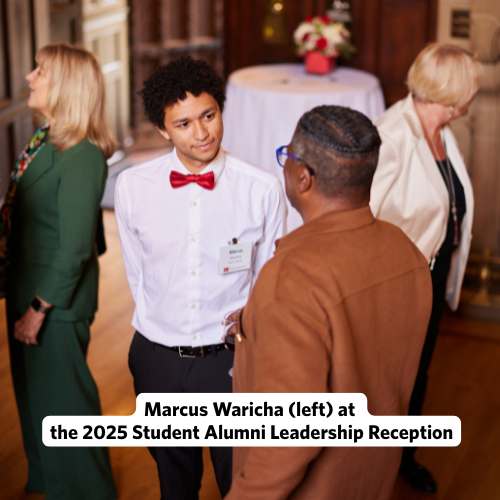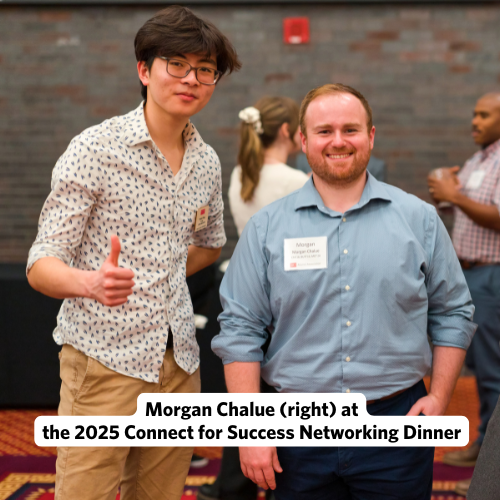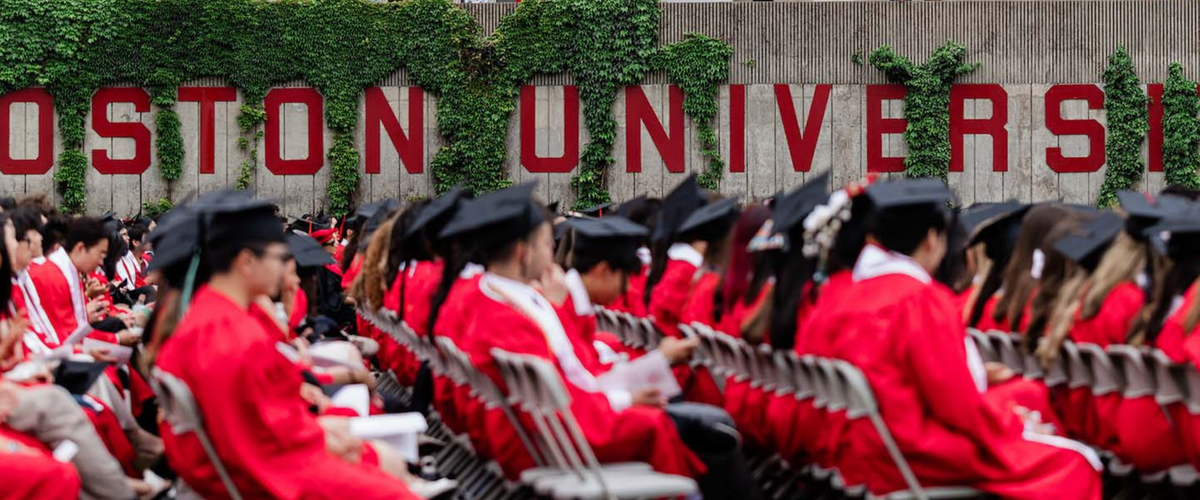Written by Maia Penzer (COM’26) | Published May 2025
For many, college graduation marks one of life’s biggest transitions—signaling the end of frequent exams, essays, extracurriculars, and a built-in social circle. Finding your new normal in the “real world” after walking across the stage on Nickerson Field can be challenging. Filled with lots of unknowns, this next chapter promises both uncertainty and opportunity.
At a recent Boston University Young Alumni Council (BUYAC) meeting, council members opened up about their own post-grad journeys. From career changes and personal growth to lessons learned through trial and error, their stories offer candid insight and helpful advice for new alums.
There’s no one “right” path, and that’s okay
 Marcus Waricha (ENG’24) always knew he wanted to pursue engineering. “I graduated in ’24, and I just started my first full-time engineering job 5 or 6 weeks ago… We make driver’s licenses, credit cards, debit cards…It’s fascinating to see the products come through,” he said.
Marcus Waricha (ENG’24) always knew he wanted to pursue engineering. “I graduated in ’24, and I just started my first full-time engineering job 5 or 6 weeks ago… We make driver’s licenses, credit cards, debit cards…It’s fascinating to see the products come through,” he said.
For Morgan Chalue (CFA’16, BUTI’16, MET’20), the journey looked a bit different.
 “I left college knowing what I didn’t want to do—which was what I studied for four years,” he reflected. “So, it was a fun process of discovery after that, of trying some new things, taking some graduate classes and scoping things out.”
“I left college knowing what I didn’t want to do—which was what I studied for four years,” he reflected. “So, it was a fun process of discovery after that, of trying some new things, taking some graduate classes and scoping things out.”
Your first job isn’t forever
A big myth BUYAC members wanted to break? That your first job out of college determines the rest of your career. Steven Maloney (ENG’19) put it simply: “Your first job is not your forever job.”
Many members shared that they ended up switching roles or even industries soon after realizing their first position wasn’t the right fit. These early jobs taught them important skills and helped them better understand what they wanted going forward.
“It’s just about what you can take from that first experience, and it’ll always be to your benefit down the line in some way,” said Justin Flynn (CGS’16, QST’18)
You’re allowed to change your mind. You’re allowed to pivot. And most importantly, you’re allowed to pursue work that actually excites you.
Patience and persistence pay off
The transition from college to career can be frustrating, especially when things don’t happen as fast as you’d hoped. The job market can be competitive, and it’s easy to feel discouraged after experiencing rejection.
Lauren Erlingheuser (COM’09, QST’22) graduated during a recession and had to push through a lot of setbacks to break into the marketing world.
 “I feel like marketing and advertising is just a competitive field to begin with,” she said. “It just takes persistence. I tried to go to as many job fairs as I could. I was applying for so many jobs. Just kept running through my resume, updating my cover letters, going on informational interviews.”
“I feel like marketing and advertising is just a competitive field to begin with,” she said. “It just takes persistence. I tried to go to as many job fairs as I could. I was applying for so many jobs. Just kept running through my resume, updating my cover letters, going on informational interviews.”
Her experience shows opportunities might not come right away, but that doesn’t mean they won’t come.
Council members also made it clear that you shouldn’t compare your timeline to others. In the age of LinkedIn updates and social media announcements, it can feel like everyone around you is moving to a big city, getting promotions, or landing their “dream job,” and it’s natural to start questioning your own progress.
“Be patient with your own process,” said Nicholas Griggs-Drane (COM’16). “Your time will come, just don’t rush it, and it’s okay to move home and to swallow your pride a little bit.”
Their insights serve as a powerful reminder that your value isn’t defined by your job title, your salary, or how fast you “make it.” It’s defined by your growth, your curiosity, and your ability to stay grounded in your goals.
Rebuilding your support system
After graduation, it can be difficult to leave the built-in support system of friends you’ve spent the past four years with. Although it’s normal for everyone to go their separate ways—it can feel lonely.
“Your support system essentially breaks up after college, because everyone moves across the nation. And on top of that, you’re so focused on doing well at work or finding a job that you essentially become siloed,” said Esen Harris (ENG’18).
But Harris also emphasized that this time of isolation is temporary, and can be a chance to build new, meaningful connections.
“It was definitely a huge period of growth…I think eventually you kind of learn to find a new circle,” he said.
Building new friendships as an adult might take more intention than it did in college, but it’s well worth the effort. In her recent virtual workshop, alumna Sarah Greisdorf (CAS’20) covers how you can find communities that align with your interests, and strengthen relationships amid busy schedules.
Resources for your next chapter
Life after college isn’t a straight line—it’s a winding road filled with unexpected turns and new experiences. Everyone’s path looks different, and the stories from BUYAC members serve as a reminder that it’s okay to feel unsure, change directions, and take your time finding your place.
If you’re looking to connect with fellow alums or find your next opportunity, make sure to join BU Connects—the personal and professional networking platform for BU alumni, students, faculty and staff. For more career advice, check out our library of career webinars by alumni industry experts.
